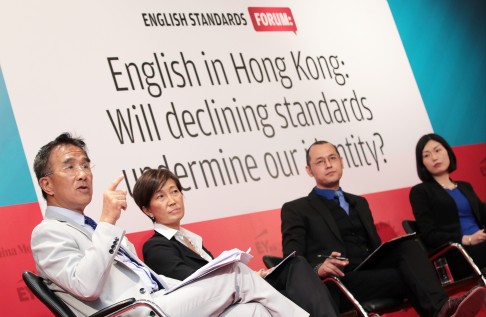Let's admit it, Hong Kong's English standards will never rise
Michael Chugani says despite all the angst, extra lessons and pressure on children, Hong Kong should realise we're on a hiding to nothing by trying to raise standards for everyone

Sometime back, I asked a senior government official at a dinner function if he would come to my TV show. He replied sheepishly he didn't think his English was good enough. My first thought was it sounded like an excuse but then realised he was actually being quite candid. He seldom speaks English at length in public and I have to admit he lacks the fluency I would expect from a senior official.
Recently, I had a guest whose below-average grasp of the language triggered some viewers to suggest I invite only those who can speak English fluently. That is a tall order, with standards on a steady decline. Being Hong Kong-born and raised, I can alternate easily between English and Cantonese but now find myself speaking mostly Cantonese out of necessity. Shop assistants often start off speaking to me in broken English but don't hide their relief when I reply in Cantonese.
I now speak in Cantonese even with locals who can speak good English. Most of them prefer that anyway. How often do you hear local Chinese speaking in English to each other even if they are proficient in the language? I can imagine Executive Councillor Arthur Li Kwok-cheung doing that with former legislator Margaret Ng Ngoi-yee. Both are more comfortable speaking in English. But don't expect former chief executive Tung Chee-hwa to speak in English with protégé Leung Chun-ying, even though both speak the language fluently.
It is pointless for people to attend English classes but switch back to Cantonese once classes are over. You cannot improve your English if you think in Chinese
Legislator Michael Tien Puk-sun, credited with making TV stations carry English subtitles for English news broadcasts to help viewers learn the language, confessed to me some time back he too finds himself speaking mostly in Cantonese out of necessity to communicate with constituents. For years, I've pushed the government to use English more often since it's also an official language here.
I have even suggested that senior officials set an example by using English from time to time in the Legislative Council. The government is only paying lip service when it stresses the importance of English. The reality is that English is not even on the radar screen. MTR officials rush to go on Chinese radio phone-in shows to explain major service breakdowns but always refuse to do the same on English radio. Their mentality is that it's not worth coming on English radio phone-in shows because of the small listener base. I know this for a fact because I co-host an English radio show.

But let's face it, overall English standards here will never rise. We have lost the cultural setting conducive to raising it. It is pointless for people to attend English classes but switch back to Cantonese once classes are over. You cannot improve your English if you think in Chinese.